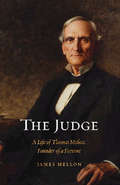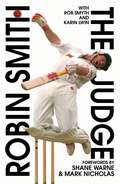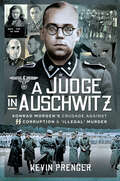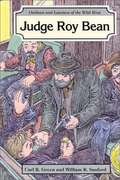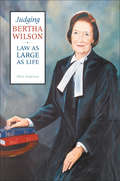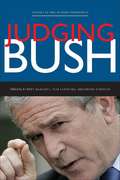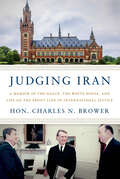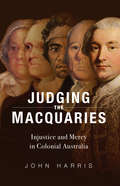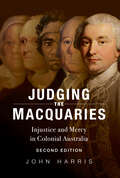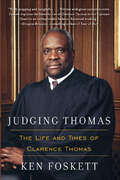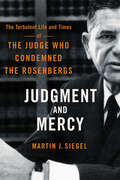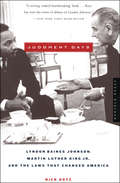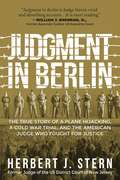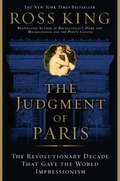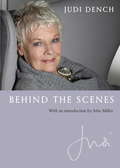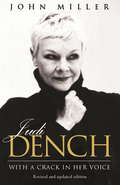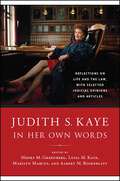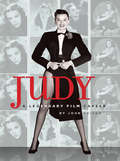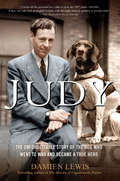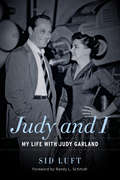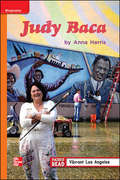- Table View
- List View
The Judge: A Life of Thomas Mellon, Founder of a Fortune
by James MellonLawyer, judge, banker, classics professor, and councilman, Thomas Mellon greatly influenced the fortunes of his hometown, Pittsburgh, throughout the nineteenth century. In the process, he became one of the city's most important business leaders, and he laid the foundation for a family that would contribute considerably to the city's growth and welfare for much of the next hundred years, becoming one of the world's most recognizable names in industry, innovation, and philanthropy. Through his in-depth examination of the extensive Mellon family archives, in The Judge James Mellon--a direct descendent of Thomas Mellon--has fashioned an incisive portrait of the elder Mellon that presents the man in full. Offering a singular and insightful characterization of the Scotch-Irish value system that governed the patriarch's work and life, James Mellon captures the judge's complexities and contradictions, revealing him as a truly human figure. Among the recent biographies of Pittsburgh's famous businessmen, The Judge stands apart from the pack because of the author's unique perspective and his objective and scholarly approach to his subject.
The Judge: More Than Just a Game
by Robin Smith Rob Smyth* SHORTLISTED FOR THE TELEGRAPH SPORTS BOOK AWARDS *Robin Smith was one of England's most popular cricketers of the 1990s. The Judge, as he was known to all, took on some of the most dangerous fast bowlers of all time with a skill and fearlessness that ensured hero status. His savage square cut drew roars of approval from fans all around the world, especially those of his beloved England and Hampshire. But when he was prematurely dumped from the England set-up at the age of 32, he had to face his toughest opponent of all - himself. Smith suffered a debilitating loss of identity, especially when he retired from professional cricket in 2003, and struggled to deal with the contradictions in his personality. Was he the Judge, the fearless warrior, or Robin Smith, the frantic worrier? Without a support structure to transition from cricket to the outside world, Smith suffered from mental health, alcohol, marital and financial problems until he hit rock bottom and planned to take his own life. In The Judge - More than Just a Game, he revisits his experience of extreme darkness and challenges received wisdom about masculinity and mental health. He also shares the many highs and lows of his eventful international and county career, including his exhilarating battles with the West Indies and his struggles against mystery spin. And he reflects fondly on a time when cricketers worked hard and partied even harder; a time almost unrecognisable to the modern day.
A Judge in Auschwitz: Konrad Morgen's Crusade Against SS Corruption & 'Illegal' Murder
by Kevin PrengerIn autumn 1943, SS judge Konrad Morgen visited Auschwitz concentration camp to investigate an intercepted parcel containing gold sent from the camp. While there Morgen found the SS camp guards engaged in widespread theft and corruption. Worse, Morgen also discovered that inmates were being killed without authority from the SS leadership. While millions of Jews were being exterminated under the Final Solution programme , Konrad Morgen set about gathering evidence of these ‘illegal murders’. Morgen also visited other camps such as Buchenwald where he had the notorious camp commandant Karl Koch and Ilse, his sadistic spouse, arrested and charged. Found guilty by an SS court, Koch was sentenced to death. Remarkably, the apparently fearless SS judge also tried to prosecute other Nazi criminals including Waffen-SS commanders Oskar Dirlewanger and Hermann Fegelein and Auschwitz Commandant Rudolf Höss. He even claimed to have tried to indict Adolf Eichmann, who was responsible for organising the mass deportation of the Jews to the extermination camps. This intriguing work reveals how the lines between justice and injustice became blurred in the Third Reich. As well as describing the actions of this often contradictory character the author questions Morgen’s motives.
Judge Roy Bean (Outlaws and Lawmen of the Wild West)
by Carl R. Green William R. Sanford- Biographies of famous and infamous men of the Western frontier. - Entices the reluctant reader to relive the exciting days of the Wild West.
Judging Bertha Wilson
by Ellen AndersonMadame Justice Bertha Wilson, the first woman appointed to the Supreme Court of Canada, is an enormously influential and controversial figure in Canadian legal and political history. This engaging, authorized, intellectual biography draws on interviews conducted under the auspices of the Osgoode Society for Legal History, held in Scotland and Canada with Madame Justice Wilson, as well as with her friends, relatives, and colleagues. The biography traces Wilson's story from her birth in Scotland in 1923 to the present. Wilson's contributions to the areas of human rights law and equality jurisprudence are many and well-known. Lesser known are her early days in Scotland and her work as a minister's wife or her post-judicial work on gender equality for the Canadian Bar Association and her contributions to the Royal Commission on Aboriginal Peoples.Through a scrupulous survey of Wilson's judgements, memos, and academic writings (many as yet unpublished), Ellen Anderson shows how Wilson's life and the law were seamlessly integrated in her persistent commitment to a stance of principled contextuality. This stance has had an enduring effect on the evolution of Canadian law and cultural history. Supported with the warmth and generosity of Wilson's numerous personal anecdotes, this work illuminates the life and throught of a woman who has left an extraordinary mark on Canada's legal landscape.
Judging Bush
by Robert Maranto Tom Lansford Jeremy JohnsonThere is no shortage of opinions on the legacy that George W. Bush will leave as 43rd President of the United States. Recognizing that Bush the Younger has been variously described as dimwitted, opportunistic, innovative, and bold, it would be presumptuous to draw any hard and fast conclusions about how history will view him. Nevertheless, it is well within academia's ability to begin to make preliminary judgments by weighing the evidence we do have and testing assumptions. In the wake of the September 11 terrorist attacks and the initially successful military campaign in Afghanistan, Bush and his administration enjoyed nearly unprecedented popularity. But after failures in Iraq and in the federal government's response to Hurricane Katrina, Bush's approval ratings plummeted. Guided by a new framework,Judging Bushboldly takes steps to evaluate the highs and lows of the Bush legacy according to four types of competence: strategic, political, tactical, and moral. It offers a first look at the man, his domestic and foreign policies, and the executive office's relationship to the legislative and judicial branches from a distinguished and ideologically diverse set of award-winning political scientists and White House veterans. Topics include Bush's decision-making style, the management of the executive branch, the role and influence of Dick Cheney, elections and party realignment, the Bush economy, Hurricane Katrina, No Child Left Behind, and competing treatments of the wars in Iraq and Afghanistan. Contributors include Lara M. Brown, David B. Cohen, Jeffrey E. Cohen, Laura Conley, Jack Covarrubias, John J. DiIulio, Jr. , William A. Galston, Frederick M. Hess, Karen M. Hult, Lori A. Johnson, Robert G. Kaufman, Anne M. Khademian, Lawrence J. Korb, Patrick McGuinn, Michael Moreland, Costas Panagopoulos, James P. Pfiffner, Richard E. Redding, Neil Reedy, Andrew Rudalevige, Charles E. Walcott, and Shirley Anne Warshaw.
Judging Iran: A Memoir of The Hague, The White House, and Life on the Front Line of International Justice
by Hon. Charles N. BrowerFrom a divided Berlin to The Hague, the Reagan White House, the forests of Costa Rica, and more, Judge Charles N. Brower shares a personal history of a life spent at the forefront of international justice— and a case for the role of law in preserving global peace.A judge of the Iran– United States Claims Tribunal for four decades, Charles N. Brower is aninternationally recognized leader in arbitration and has handled cases on six continents. With quick wit and a keen eye for adventure, he takes readers on a tour of his extraordinary career.As a young lawyer fresh from Harvard, Brower quickly made partner at a Wall Streetfirm. After just four months, however, he left the expected path to join the U.S. State Department, embarking on a career that put him in the thick of Cold War Europe and led to a lifelong focus on international law.Brower' s drive carried him to the heart of pressing issues, including globalization, governmental ethics, environmentalism, and human rights. At each stop, Brower encountered criminals and victims, advocates and miscreants, especially at the Iran– United States Claims Tribunal, where heated disagreements between judges once erupted into physical violence. His work at The Hague was interrupted only by his time as an advisor to President Ronald Reagan at the height of the Iran– Contra scandal, and Brower eventually became the most-appointed American judge ad hoc of the International Court of Justice.Judging Iran is a frank insider account of the highest echelons of international law. As an active judge to this day, Brower offers a nuanced history of modern arbitration between nations, from our earliest concept of international law to today' s efforts for justice. And, as a global citizen, he argues that the law is essential in our work for peace.
Judging the Macquaries: Injustice and Mercy in Colonial Australia
by John HarrisThe Black Lives Matter movement is bringing the characters of powerful people in colonial times into sharp focus, particularly their attitudes and actions towards slavery and indigenous peoples. Lachlan and Elizabeth Macquarie are among those being scrutinised and reassessed. They arrived at the penal colony of NSW, a remote outpost of the British empire in 1809. The European invaders had barely survived two decades in an alien environment but, for countless millennia, home to its Aboriginal inhabitants. Lachlan was the new governor. Elizabeth, his wife, was his closest friend and fiercest supporter.The colony was an unruly mix of convicts, soldiers and settlers. At the time, Lachlan Macquarie’s leadership was judged by his handling of the convicts. Lachlan and Elizabeth treated the convicts humanely, forgiving them and restoring them to society. His superiors considered him far too lenient, yet to Sydneysiders, as ‘The Father of Australia’, he had gifted them the path to a prosperous future.Today, Lachlan is being judged by his treatment of Aboriginal people. The Macquaries thought they were being kind, yet they ignored the injustice of dispossession. Aboriginal people were British citizens under the protection of British law – a law they were expected to obey. Although known for his humanity, Lachlan had a fatal flaw. When hostilities broke out between Aborigines and settlers on the outskirts of the colony, he took the fateful decision to send in the military. This will never be forgotten, yet his sins were the sins of the empire he tried so hard to serve.Award-winning author and historian John Harris never baulks at handling controversial subjects. In this timely book, he tackles the disputes that marked Lachlan Macquarie’s period as governor and the complex controversies which still surround his actions today.
Judging the Macquaries: Injustice and Mercy in Colonial Australia
by John HarrisThe Black Lives Matter movement is bringing the characters of powerful people in colonial times into sharp focus, particularly their attitudes and actions towards slavery and indigenous peoples. Lachlan and Elizabeth Macquarie are among those being scrutinised and reassessed. They arrived at the penal colony of NSW, a remote outpost of the British empire in 1809. The European invaders had barely survived two decades in an alien environment but, for countless millennia, home to its Aboriginal inhabitants. Lachlan was the new governor. Elizabeth, his wife, was his closest friend and fiercest supporter.The colony was an unruly mix of convicts, soldiers and settlers. At the time, Lachlan Macquarie’s leadership was judged by his handling of the convicts. Lachlan and Elizabeth treated the convicts humanely, forgiving them and restoring them to society. His superiors considered him far too lenient, yet to Sydneysiders, as ‘The Father of Australia’, he had gifted them the path to a prosperous future.Today, Lachlan is being judged by his treatment of Aboriginal people. The Macquaries thought they were being kind, yet they ignored the injustice of dispossession. Aboriginal people were British citizens under the protection of British law – a law they were expected to obey. Although known for his humanity, Lachlan had a fatal flaw. When hostilities broke out between Aborigines and settlers on the outskirts of the colony, he took the fateful decision to send in the military. This will never be forgotten, yet his sins were the sins of the empire he tried so hard to serve.Award-winning author and historian John Harris never baulks at handling controversial subjects. In this timely book, he tackles the disputes that marked Lachlan Macquarie’s period as governor and the complex controversies which still surround his actions today.
Judging Thomas: The Life and Times of Clarence Thomas
by Ken FoskettClarence Thomas, the youngest and most controversial member of the Supreme Court, could become the longest-serving justice in history, influencing American law for decades to come. Who is this enigmatic man? And what does he believe in?Judging Thomas tells the remarkable story of Clarence Thomas's improbable journey from hardscrabble beginnings in the segregated South to the loftiest court in the land. With objectivity and balance, author Ken Foskett chronicles Thomas's contempt for upper-crust blacks who snubbed his uneducated, working-class roots; his flirtation with the priesthood and, later, Black Power; the resentment that fueled his opposition to affirmative action; the conservative beliefs that ultimately led him to the Supreme Court steps; and the inner resilience that propelled him through the doors.Based on interviews with Thomas himself, fellow justices, family members, and hundreds of friends and associates, Judging Thomas skillfully unravels perhaps the most complex, controversial, and powerful public figure in America today.
Judgment and Mercy: The Turbulent Life and Times of the Judge Who Condemned the Rosenbergs
by Martin J. SiegelIn Judgment and Mercy, Martin J. Siegel offers an insightful and compelling biography of Irving Robert Kaufman, the judge infamous for condemning Julius and Ethel Rosenberg to death for atomic espionage.In 1951, world attention fixed on Kaufman's courtroom as its ambitious young occupant stridently blamed the Rosenbergs for the Korean War. To many, the harsh sentences and their preening author left an enduring stain on American justice. But then the judge from Cold War central casting became something unexpected: one of the most illustrious progressive jurists of his day. Upending the simplistic portrait of Judge Kaufman as a McCarthyite villain, Siegel shows how his pathbreaking decisions desegregated a Northern school for the first time, liberalized the insanity defense, reformed Attica-era prisons, spared John Lennon from politically motivated deportation, expanded free speech, brought foreign torturers to justice, and more. Still, the Rosenberg controversy lingered. Decades later, changing times and revelations of judicial misconduct put Kaufman back under siege. Picketers dogged his footsteps as critics demanded impeachment. And tragedy stalked his family, attributed in part to the long ordeal. Instead of propelling him to the Supreme Court, as Kaufman once hoped, the case haunted him to the end.Absorbingly told, Judgment and Mercy brings to life a complex man by turns tyrannical and warm, paranoid and altruistic, while revealing intramural Jewish battles over assimilation, class, and patriotism. Siegel, who served as Kaufman's last law clerk, traces the evolution of American law and politics in the twentieth century and shows how a judge unable to summon mercy for the Rosenbergs nonetheless helped expand freedom for all.
Judgment Days: Lyndon Baines Johnson, Martin Luther King, Jr., and the Laws That Changed America (. Ser.)
by Nick KotzA Pulitzer Prize winner&’s up-close account of how a white president and a black minister ultimately came together to pass the Civil Rights Act of 1964. They were the unlikeliest of partners: a white Texan politician and an African American minister who led a revolution. But together, President Lyndon Johnson and the Reverend Martin Luther King Jr. managed to achieve a common goal. In Judgment Days, Pulitzer Prize–winning journalist Nick Kotz provides a behind-the-scenes look at the complicated working relationship that yielded the Civil Rights Act of 1964 and the Voting Rights Act of 1965—some of the most substantial civil rights legislation in American history. Drawing on previously unavailable sources, including telephone conversations, FBI wiretaps, and communications between Johnson and FBI director J. Edgar Hoover, Kotz examines the events that brought the two influential men together—and the forces that ultimately drove them apart. &“[A] finely honed portrait of the civil rights partnership President Johnson and Rev. Martin Luther King Jr. forged. . . . A fresh and vivid account.&” —TheWashington Post Book World
Judgment in Berlin: The True Story of a Plane Hijacking, a Cold War Trial, and the American Judge Who Fought for Justice
by Herbert J. Stern"Suspenseful...moving...equal to any fictional thriller." —San Francisco Chronicle In August 1978, the Iron Curtain still hung heavily across Europe. To escape from oppressive East Berlin, an East German couple, Hans Detlef Alexander Tiede and Ingrid Ruske, hijacked a Polish airliner and diverted it to the American sector of West Berlin. Along with the couple, several passengers spontaneously defected to the West, and were welcomed by US officials. But within hours, Communist officials reminded the West of the anti-hijacking agreements in the Warsaw Pact, and thus the fugitives were arrested by the US State Department. Thirty-four years after World War II, the United States built a court in the middle of West Berlin, the former capital of the Third Reich, in the building that once housed the Luftwaffe, to try the hijacking couple. Former NJ district attorney, now a judge, Herbert J. Stern was appointed the "United States Judge for Berlin." What followed was a trial full of maneuvers and strategies that would put Perry Mason to shame, and answered the question: what is allowed to people seeking freedom? Judgment in Berlin, also a major motion picture starring Martin Sheen and Sean Penn, is unsurpassed as a true-life suspense story, with its vivid accounts of daring escapes, close calls, diplomatic intrigue, and dramatic courtroom confrontations. The original edition won the Freedom Foundation Award, and this updated edition includes a new introduction from author and trial judge Herbert J. Stern.
The Judgment of Paris: The Revolutionary Decade That Gave the World Impressionism
by Ross KingThe fascinating new book by the author of Brunelleschi's Dome and Michelangelo and the Pope's Ceiling: a saga of artistic rivalry and cultural upheaval in the decade leading to the birth of Impressionism.If there were two men who were absolutely central to artistic life in France in the second half of the nineteenth century, they were Edouard Manet and Ernest Meissonier. While the former has been labelled the "Father of Impressionism" and is today a household name, the latter has sunk into obscurity. It is difficult now to believe that in 1864, when this story begins, it was Meissonier who was considered the greatest French artist alive and who received astronomical sums for his work, while Manet was derided for his messy paintings of ordinary people and had great difficulty getting any of his work accepted at the all-important annual Paris Salon. Manet and Meissonier were the Mozart and Salieri of their day, one a dangerous challenge to the establishment, the other beloved by rulers and the public alike for his painstakingly meticulous oil paintings of historical subjects. Out of the fascinating story of their parallel careers, Ross King creates a lens through which to view the political tensions that dogged Louis-Napoleon during the Second Empire, his ignominious downfall, and the bloody Paris Commune of 1871. At the same time, King paints a wonderfully detailed and vivid portrait of life in an era of radical social change: on the streets of Paris, at the new seaside resorts of Boulogne and Trouville, and at the race courses and picnic spots where the new bourgeoisie relaxed. When Manet painted Dejeuner sur l'herbe or Olympia, he shocked not only with his casual brushstrokes (described by some as applied by a 'floor mop') but with his subject matter: top-hatted white-collar workers (and their mistresses) were not considered suitable subjects for 'Art'. Ross King shows how, benign as they might seem today, these paintings changed the course of history. The struggle between Meissonier and Manet to see their paintings achieve pride of place at the Salon was not just about artistic competitiveness, it was about how to see the world.Full of fantastic tidbits of information (such as the use of carrier pigeons and hot-air balloons during the siege of Paris), and a colourful cast of characters that includes Baudelaire, Courbet, and Zola, with walk-on parts for Monet, Renoir, Degas, and Cezanne, The Judgment of Paris casts new light on the birth of Impressionism and takes us to the heart of a time in which the modern French identity was being forged.
Judi: With an Introduction by John Miller
by Dame Judi Dench'National treasure? I hate that. Too dusty, too in a cupboard, too behind glass, too staid ... What I love is being part of a company. On stage I am not trying to be myself, I'm trying to be someone else, the more unlike me the better.'From her first theatrical roles as a teenager in York to her scene-stealing performances as 'M' in the James Bond films, Dame Judi Dench's professional life has consisted of non-stop acting, leading to numerous accolades, including an Academy Award.BEHIND THE SCENES is a uniquely personal take on Dame Judi's life and brilliant career, showing her off stage as well as on: in the wings, off sets, in dressing rooms and happily larking about. Beautifully illustrated with photographs from her own collections, here are reflections and reminiscences on those who have mattered to her most - her family, fellow actors, directors and writers - communicated with the truth and insight of her acting.
Judi: With an Introduction by John Miller
by Judi Dench'National treasure? I hate that. Too dusty, too in a cupboard, too behind glass, too staid ... What I love is being part of a company. On stage I am not trying to be myself, I'm trying to be someone else, the more unlike me the better.'From her first theatrical roles as a teenager in York to her scene-stealing performances as 'M' in the James Bond films, Dame Judi Dench's professional life has consisted of non-stop acting, leading to numerous accolades, including an Academy Award.BEHIND THE SCENES is a uniquely personal take on Dame Judi's life and brilliant career, showing her off stage as well as on: in the wings, off sets, in dressing rooms and happily larking about. Beautifully illustrated with photographs from her own collections, here are reflections and reminiscences on those who have mattered to her most - her family, fellow actors, directors and writers - communicated with the truth and insight of her acting.
Judi Dench: With A Crack In Her Voice
by John MillerThe first full biography of Britain's leading actress of her time.Whether it is her sunny temperament, her gift of laughter, her wide-ranging abilities, or all three, Judi Dench is without doubt a star. Shortlisted for a 1998 Oscar for her performance as Queen Victoria in MRS BROWN, she then won one for her role as Queen Elizabeth in SHAKESPEARE IN LOVE. Judi Dench is widely loved, and not only among the theatrical profession. Her long-running appearance opposite Geoffrey Palmer in the TV situation comedy AS TIME GOES BY has run to four series and gained her a TV TIMES readers' award as ¿the actress we most wish see more often on television¿. She juggles the National Theatre (a sell-out season in Sondheim's A LITTLE NIGHT MUSIC and David Hare's AMY'S VIEW) with TV and films (she is now established as 'M' in the latest James Bond series).Since the paperback edition was published, John Miller has written a new chapter, bringing what is fast becoming a classic biography completely up-to-date.
Judi Dench: With A Crack In Her Voice
by John MillerThe first full biography of Britain's leading actress of her time.Whether it is her sunny temperament, her gift of laughter, her wide-ranging abilities, or all three, Judi Dench is without doubt a star. Shortlisted for a 1998 Oscar for her performance as Queen Victoria in MRS BROWN, she then won one for her role as Queen Elizabeth in SHAKESPEARE IN LOVE. Judi Dench is widely loved, and not only among the theatrical profession. Her long-running appearance opposite Geoffrey Palmer in the TV situation comedy AS TIME GOES BY has run to four series and gained her a TV TIMES readers' award as ¿the actress we most wish see more often on television¿. She juggles the National Theatre (a sell-out season in Sondheim's A LITTLE NIGHT MUSIC and David Hare's AMY'S VIEW) with TV and films (she is now established as 'M' in the latest James Bond series).Since the paperback edition was published, John Miller has written a new chapter, bringing what is fast becoming a classic biography completely up-to-date.
The Judiciary I Served
by P. Jaganmohan ReddyThe Judiciary I Served describes the long and distinguished career in law of an eminent jurist from his early days as a barrister to his retirement from the Supreme Court of India.
Judith S. Kaye in Her Own Words: Reflections on Life and the Law, with Selected Judicial Opinions and Articles (Excelsior Editions)
by Judith S. KayeIn 1983, Judith S. Kaye (1938–2016) became the first woman appointed to the Court of Appeals, New York's highest court. Ten years later, she became the first woman to be appointed chief judge of the xourt, and by the time she retired, in 2008, she was the longest-serving chief judge in the court's history. During her long career, she distinguished herself as a lawyer, jurist, reformer, mentor, and colleague, as well as a wife and mother. Bringing together Kaye's own autobiography, completed shortly before her death, as well as selected judicial opinions, articles, and speeches, Judith S. Kaye in Her Own Words makes clear why she left such an enduring mark upon the court, the nation, and all who knew her.The first section of the book, Kaye's memoir, focuses primarily on her years on the Court of Appeals, the inner workings of the court, and the challenges she faced, as chief judge, in managing a court system populated by hundreds of judges and thousands of employees.The second section, a carefully chosen selection of her written opinions (and occasional dissents), reveals how she guided the law in New York State for almost a quarter century with uncommon vision and humanity. Her decisions cover every facet of New York and federal law and have often been quoted and followed nationally.The final section of the book includes selections from her numerous articles and speeches, which cover the field, from common law jurisprudence to commercial law to constitutional analysis, all with an eye to the future and, above all, how the law can best affect the everyday lives of people who come to court—willingly or unwillingly—including, not least, those most in need of the law."An extraordinary woman, jurist, and leader who had a striking impact on the law and the administration of justice in New York State and beyond. This collection is more than a simple record of a remarkable life. It is a treasure—not only for those of us who knew and admired Judith but for all who may seek to understand and appreciate the profound impact she had on the law, the legal profession, and the administration of justice." — from the Foreword by Honorable Janet DiFiore
Judy: A Legendary Film Career
by John FrickeThrough her incomparable work on screen, stage, record, radio, and television, Judy Garland earned renown as OC The WorldOCOs Greatest Entertainer. OCO It was as a motion pictureastar though, that she first rose to international fame. Fromaher feature film debut in 1936 through the aptly titled "I Could Go on Singing" in 1963, she lit upathe screen with a magic uniquely hersOCoand dazzled world-wide audiences of all ages. aJudy Garlandastarred inatwoadozenaof the all-time classic movie musicals, among them "A Star is Born," "Meet Me in St. Louis," "Babes in Arms"," "" Easter Parade," "For Me and My Gal," and "The Harvey Girls. " Her dramaticaturns in "Judgment at Nuremberg," "The Clock," and "A Child is Waiting" won addedaacclaim. And perhaps most unforgettably, she starred as Dorothy Gale in the best-loved motion picture of all time: "The Wizard of Oz. "a"Judy: A Legendary Film Career"atells the story of GarlandOCOs movie workain unprecedented detail. Hundreds of never-before-published photos, newly-assembled contemporary reviews, insight from her costars and coworkers, and production histories are provided for each film in which she appeared. Highlighting and complimenting the feature films is a definitive biography;aan examinationaofaJudyOCOs short subjects; details of the movies she did not complete; and an enthrallingacompendium of film projects for which she was considered or rumored. The text is illustrated by more than five hundred photos, encompassing poster art; costume tests; behind-the-scenes candids; onstage and backstage glimpses of her theatrical successes; and personal snapshots. a"Judy"ais the exhaustively researched work of historian John Fricke. Heacelebrates as never before the heart, humor, and incandescent motion picture achievement of the one-and-only Judy Garland. "
Judy: The Unforgettable Story of the Dog Who Went to War and Became a True Hero
by Damien LewisBritish bestselling author Damien Lewis is an award-winning journalist who has spent twenty years reporting from war, disaster, and conflict zones. Now Lewis brings his first-rate narrative skills to bear on the inspiriting tale of Judy--an English pointer who perhaps was the only canine prisoner of war. After being bombed and shipwrecked repeatedly while serving for several wild and war-torn years as a mascot of the World War II Royal Navy Yangtze river gunboats the Gnat and the Grasshopper, Judy ended up in Japanese prisoner of war camps in North Sumatra. Along with locals as slave labor, the American, Australian, and British POWs were forced to build a 1,200-mile single-track railroad through the most horrifying jungles and treacherous mountain passes. Like the one immortalized in the film The Bridge on the River Kwai, this was the other death-railroad building project where POWs slaved under subhuman conditions. In the midst of this living hell was a beautiful and regal-looking liver and white English pointer named Judy. Whether she was scavenging food to help feed the starving inmates of a hellish Japanese POW camp, or by her presence alone bringing inspiration and hope to men, she was cherished and adored by the Allied servicemen who fought to survive alongside her. Judy's uncanny ability to sense danger, matched with her quick thinking and impossible daring saved countless lives. More than a close companion she shared in both the men's tragedies and joys. It was in recognition of the extraordinary friendship and protection she offered amidst the unforgiving and savage environment of a Japanese prison camp in Indonesia that she gained her formal status as a POW. From the author of The Dog Who Could Fly and the co-author of Sergeant Rex and It's All About Treo comes one of the most heartwarming and inspiring tales you will ever read.
Judy and I: My Life with Judy Garland
by Randy L. Schmidt Sid LuftThe third of Judy Garland's five husbands, Sid Luft was the one man in her life who stuck around. He was chiefly responsible for the final act of Judy's meteoric comeback after she was unceremoniously booted off the MGM lot: he produced her iconic, Oscar-nominated vehicle A Star Is Born and expertly shaped her concert career. Previously unpublished, Sid Luft's intimate autobiography tells his and Judy's story in hard-boiled yet elegant prose. It begins on a fateful night in New York City when the not quite divorced Judy Garland and the not quite divorced Sid Luft meet at Billy Reed's Little Club and fall for each other. The romance lasted Judy's lifetime, despite the separations, the reconciliations, and the divorce. Under Luft's management, Judy came back bigger than ever, building a singing career that rivaled Sinatra's. However, her drug dependencies and suicidal tendencies put a tremendous strain on the relationship. Sid did not complete his memoir; it ended in 1960 after Judy hired David Begelman and Freddie Fields to manage her career. But Randy L. Schmidt, acclaimed editor of Judy Garland on Judy Garland and author of Little Girl Blue: The Life of Karen Carpenter, seamlessly pieced together the final section of the book from extensive interviews with Sid, most previously unpublished. Despite everything, Sid never stopped loving Judy and never forgave himself for not being able to ultimately save her from the demons that drove her to an early death at age forty-seven in 1969. Sid served as chief conservator of the Garland legacy until his death at the age of eighty-nine in 2005. This is his testament to the love of his life.
Judy Blume's Story
by Betsy LeeA biography of Judy Blume, perhaps the most popular writer of juvenile fiction today, based on first hand information from the writer herself.
